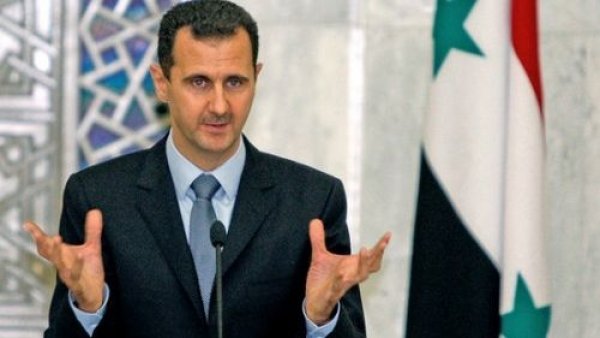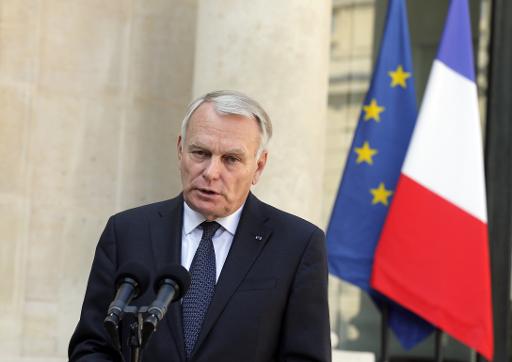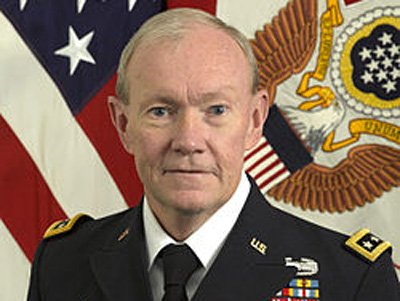Home Tags Posts tagged with "syrian regime"
syrian regime
Syrian President Bashar al-Assad has appeared on Russian TV to confirm that his country’s chemical weapons will be placed under international control.
Bashar al-Assad’s comments, to Rossiya 24, came as US and Russian foreign ministers prepared to meet in Geneva to discuss the plan, proposed by Russia earlier this week.
He insisted that the move was a result of the Russian initiative and not the threat of US military action.
The US accuses the Syrian regime of killing hundreds in a chemical attack.
Syrian government denies the allegation, blaming rebels for the attack in the Ghouta area of the capital, Damascus, on August 21.
Russia announced its proposal for dealing with the escalating chemical weapons crisis on Monday, as the US Congress was preparing to vote on whether to back President Barack Obama’s moves towards military action against Syria.

Bashar al-Assad has appeared on Russian TV to confirm that Syria’s chemical weapons will be placed under international control
On Thursday, Russian Foreign Minister Sergei Lavrov outlined three main phases of the proposal:
- Syria joins the Chemical Weapons Convention, which outlaws the production and use of the weapons
- Syria reveals where its chemical weapons are stored and gives details of its programme
- Experts decide on the specific measures to be taken
In his interview, which has not yet been broadcast in full, Bashar al-Assad told state-run Rossiya 24: “Syria is placing its chemical weapons under international control because of Russia. The US threats did not influence the decision.”
He confirmed that Syria would send relevant documents to the UN “in the next few days” as part of the process of signing the chemical weapons convention.
Bashar al-Assad said Syria would then submit information on its chemical weapons one month after signing.
He also said that Russia’s proposal was “not unilateral”, adding: “Syria will accept it if America stops military threats and if other countries supplying the rebels with chemical weapons also abide by the agreement.”
Bashar al-Assad said only Russia could make the agreement happen as “Syria has neither contacts with, nor trust in, America”.
Sergei Lavrov – who is scheduled to meet US Secretary of State John Kerry in Geneva on Thursday to discuss the plan – said during a visit to Kazakhstan: “I am sure that there is a chance for peace in Syria. We cannot let it slip away.”
He did not mention the destruction of the weapons, which was part of Moscow’s original proposal but is thought to be a sticking point in negotiations with Damascus.
Before meeting Sergei Lavrov, John Kerry is holding talks with UN-Arab League envoy to Syria, Lakhdar Brahimi.
[youtube f7kHr3LKJwo]
French Prime Minister Jean-Marc Ayrault is presenting intelligence to MPs which he says shows Syria used chemical weapons.
The dossier is said to show that Syria has large chemical stockpiles and was behind a chemical attack which the US says killed more than 1,400 people.
France and the US are both pushing for punitive military action against the Syrian regime. The UK parliament has voted to stay out of such a raid.
Damascus denies the attack, blaming rebel forces for the use of chemicals.
However, NATO Secretary General Anders Fogh Rasmussen has said he is personally convinced that a chemical attack took place and that the government of President Bashar al-Assad was responsible.
There must be “a firm international response” to deter any future use of such weapons, he said, or else it would send a “dangerous signal to dictators all over the world”.

French PM Jean-Marc Ayrault is presenting intelligence to MPs which shows Syria used chemical weapons
But he added that he did envisage NATO having a role in such action, saying he would expect any military response to be “a very short, measured, targeted operation” and that the alliance’s resources would not be needed.
Meanwhile fighting has continued across Syria, in a conflict which has already left an estimated 100,000 people dead since 2011. On Monday, activists said 20 rebel fighters were killed in an army ambush in Adra, north-east of Damascus, AFP news agency reports.
The alleged chemical attack took place in the Gouta, an eastern area of the capital on 21 August. The US says 426 children were among the more than 1,400 people killed.
The US administration has already presented its case that the Assad regime was behind the attack, and now Jean-Marc Ayrault will present France’s own intelligence dossier to parliamentary leaders.
“We are going to give the MPs everything we have – classified until now – to enable every one of them to take on board the reality of the unacceptable attack,” he said on Monday.
French MPs are due to debate the issue at an extraordinary session of parliament on Wednesday.
President Francois Hollande is constitutionally able to order an attack without parliamentary approval, but there is growing pressure for a vote on Syria, as happened in the UK and has been promised in the US.
US lawmakers are due to reconvene next week, and White House officials have said that when it comes to a vote, they believe there will be enough support for the president.
Secretary of State John Kerry said on Sunday samples from hair and blood gathered after the August 21 attack had tested positive for “signatures of sarin”, and that he was confident Congress would give its approval for strikes, “because they understand the stakes”.
However, some lawmakers have expressed doubts about President Barack Obama’s plan for a “limited, narrow” military operation, questioning its purpose and effectiveness.
[youtube 3w_NuFiYZNs]
Syria may have used chemical weapons against rebels, the White House has said.
US intelligence agencies believe “with varying degrees of confidence” that the nerve agent sarin had been deployed on a “small scale”, and did not say where or when it had been used.
The White House has warned chemical weapons use would be a “red line” for possible intervention, but says this intelligence does not represent proof.
Republicans in Congress called on Thursday for a strong US response.
The assessment was made in letters to lawmakers on Thursday signed by Miguel Rodriguez, White House director of the office of legislative affairs.
“Our intelligence community does assess, with varying degrees of confidence, that the Syrian regime has used chemical weapons on a small scale in Syria, specifically, the chemical agent sarin,” one of the letters said.
But it added: “Given the stakes involved, and what we have learned from our own recent experiences, intelligence assessments alone are not sufficient – only credible and corroborated facts that provide us with some degree of certainty will guide our decision-making.”
The phrase “varying degrees of confidence” is normally used to reflect differences in opinion within the intelligence community.

Syria may have used chemical weapons against rebels, the White House has said
Speaking to reporters in Abu Dhabi on Thursday, US Defence Secretary Chuck Hagel told reporters in Abu Dhabi that the use of sarin “violates every convention of warfare”.
Secretary of State John Kerry said there had been two instances of chemical weapons use in Syria.
The UK Foreign Office echoed the US claims, saying it had “limited but persuasive information from various sources” of chemical weapons use in Syria.
It is understood that Britain obtained samples from inside Syria that have been tested by the Defence Science and Technology Laboratory at Porton Down, Wiltshire.
“Material from inside Syria tested positive for sarin,” a Foreign Office spokesman said.
Syria is believed to possess large quantities of chemical weapons and there has been heightened concern among the international community in recent months about the safety of the stockpiles.
Although there have been numerous accusations, there has so far not been any confirmation that chemical weapons have been used during Syria’s two-year-old conflict.
President Barack Obama warned in December that Syrian President Bashar al-Assad would face “consequences” if he used such weapons.
The letters released on Thursday were sent to powerful US senators John McCain and Carl Levin.
In response, Senator John McCain told reporters: “It’s pretty obvious that red line has been crossed.”
John McCain recommended arming the opposition, a step the White House has been reluctant to take. He also urged taking steps to ensure that Syria’s chemical weapons did not fall into the wrong hands.
“It does not mean boots on the ground,” the Arizona senator added.
Democrat Dianne Feinstein, chair of the Senate Intelligence Committee, called for international action to help secure Syria’s stockpile of chemical arms.
Robert Menendez, the Democratic Chairman of the Senate Foreign Relations Committee, said options included “an internationally recognized no-fly zone, providing lethal assistance to vetted opposition forces, and sanctioning the transfer of arms to the regime”.
White House officials said the US would consult with allies and seek more evidence to confirm their intelligence.
On Tuesday, a senior Israeli military official accused Syrian forces of having used the nerve agent sarin against rebels several times. People can normally recover from small doses.
Speaking at a security conference in Jerusalem, Brigadier General Itai Brun cited photographs of victims foaming at the mouth and with constricted pupils and other unspecified symptoms.
Syria’s government and rebels have accused each other of using chemical weapons. A UN team is trying to enter Syria to investigate.
Sarin is a colorless and highly toxic nerve agent that can cause convulsions, paralysis and death within minutes if it is absorbed through inhalation, ingestion, or contact with skin or eyes.
According to the UN, at least 70,000 people have been killed in the Syrian conflict.
[youtube t6wXfhtMnms]
US top military officer General Martin Dempsey has claimed that Iran is helping to build and train a militia in Syria to prop up embattled President Bashar al-Assad.
General Martin Dempsey said the militia was intended to take the pressure off battle-weary Syrian regime forces.
Iran has described Syria as part of a vital regional alliance that Tehran will not allow to be broken.
Meanwhile, a summit of Islamic countries is due to suspend Syrian membership, despite Iranian objections.
The 57-member Organisation of Islamic Co-operation is expected to endorse the decision of its foreign ministers at the summit in Mecca, Saudi Arabia.
Saudi state TV showed King Abdullah welcoming leaders with Iranian President Mahmoud Ahmadinejad at his side. They were shown talking and laughing together.
Gen. Martin Dempsey, chairman of the US Joint Chiefs of Staff, said Syrian regime forces would be “taxed” after fighting for almost 18 months.

Gen. Martin Dempsey, chairman of the US Joint Chiefs of Staff, said Syrian regime forces would be "taxed" after fighting for almost 18 months
“They are having re-supply problems, they are having morale problems, they are having the kind of wear-and-tear that would come of being in a fight for as long as they have,” he said.
He said Iran was training a militia “made up of Syrians, generally Shia and some Alawite,” a reference to the minority Shia Islam offshoot to which President Assad belongs.
It was called “jaish ashaabi” or “army of the people”, Gen. Martin Dempsey said.
The mainly Sunni Muslim rebels in Syria are being backed by Sunni-ruled Arab states such as Saudi Arabia and Qatar, as well as Turkey.
Speaking at the same news conference, US Defence Secretary Leon Panetta said it had become obvious that Iran was providing assistance and training for the Syrian regime.
“We do not think that Iran ought to be playing that role at this moment in time,” he said.
“It is adding to the killing that’s going on in Syria, and it tries to bolster a regime that we think ultimately is going to come down.”
Gen. Martin Dempsey said Washington had held talks with Syria’s neighbors Jordan and Turkey about the possible need for a safe zone, amid an influx of refugees fleeing the fighting.
“With a safe haven would probably come some form of no-fly zone, but we are not planning anything unilaterally,” he said.
Gen. Martin Dempsey also said it appeared that rebels had recently shot down a Syrian warplane, despite Damascus insisting that it had suffered a technical fault.
However, he said there was no indication that the rebels were armed with heavy weapons or surface-to-air missiles.
He said the jet could have been brought down with small-arms fire.




